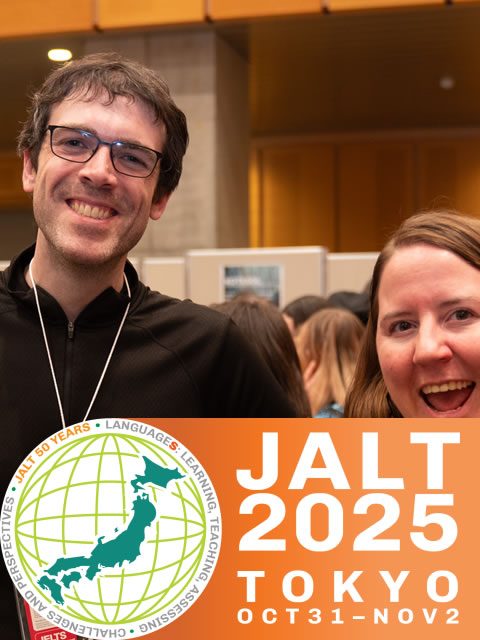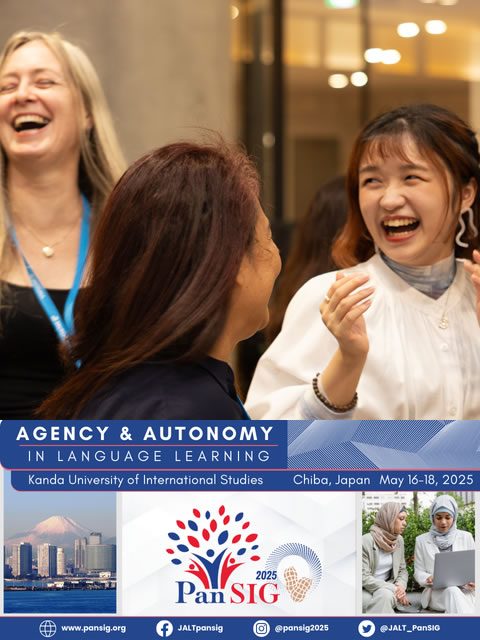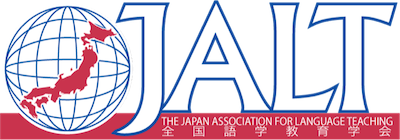Your cart is currently empty!
2018 Technology in Teaching (TnT) Workshops
•
Digital Technology for Teaching and Learning
Friday, 23 November 2018, 1:30 – 7:00 PM
As digital communications technologies become embedded in language education, teachers face the challenge of selecting appropriate tools and learning how to use them. The aim of the JALT Pre-Conference Technology in Teaching (TnT) Workshops is to help teachers navigate their way through the exciting array of educational technologies available, select those that are appropriate for their teaching context, and learn how to effectively make use of them in the classroom. The TnT presenters, all experts in technology, will offer guidance on using technology and share ways to best integrate technology with language teaching practices. Participants should bring along a Wi-Fi or cellular-connected device to participate fully in sessions. Check out the TnT Facebook event.
For registration information, see the conference registration page.
TnT Presentation Schedule (Friday, Nov. 23)
Room
1st Session (1:30 – 3:00)
2nd Session (3:30 – 5:00)
3rd Session (5:30 – 7:00)
901
Will SandersCreating flipped classroom for phonics
Malcolm SwansonCreating self-paced Moodle courses
Parisa MehranHow to transform your classroom with AR and VR
902
Bob CvitkovicApp Architecture for research and data collection
John BlakeVisualizing language: Using Regex and JavaScript
Eng Hai Tan Flipgrid – What can it do for my EFL students?
903
Rab PatersonZotero: see it-save it-sort it-search it-cite it
Paul DanielsLeveraging ASR technologies in the language class
Stephen PatonZipGrade: scan response forms with your phone
Branden KirchmeyerCollaborating with Microsoft Teams and Office 365 Classes
Mark ShrosbreeUsing technology to involve students
Dawn K. LittlePowToon: A tool for dynamic presentations
905
Coffee & Snacks
Creating flipped classroom for phonics
Will Sanders
This workshop will walk teachers through how and why to create digital content for flipped classroom teaching for Kindergarten Phonics. By the end of the workshop teachers (regardless of technological comfort levels) will be able to create short interactive digital content for their learners to use on their devices at home. This will reinforce the student’s understanding of the target sounds and assist parents in becoming more involved in the process.
App Architecture for research and data collection
Bob Cvitkovic
This workshop will describe the design process of an English language app created for data collection for a research project that was sponsored with funding from a MEXT grant. The app was designed to collect user metrics and test scores. The emphasis of this workshop is not on the research results obtained, but on the design process that lead to the completion of a working research app, which had data collection capability. In this presentation, the entire creation process will be covered, from software used, (both free and paid, but accessible to anyone; no proprietary software) hardware, and necessary skills required for successful completion. Workshop participants will take away knowledge of, 1) how to construct an app so that it can be used for class research data collection; 2) the necessary skills required to successfully complete a project of this complexity; 3) which development tools (software, hardware, and websites) are needed during a project of this type; and 4) learn about the four stages of increasing resource commitment: a) planning, b) prototyping, c) development, and d) distribution. Participants will walk away with tips and hints to avoid many of the pitfalls when undertaking a similar project. Finally, the necessary project management skills required to successfully find, create, and manage a team will also be discussed. Participants are encouraged to ask questions throughout the workshop, and do not need to prepare any software. Only an interest in the topic is necessary.
Zotero: See it-save it-sort it-search it-cite it
Rab Paterson
Zotero is a free, open source, cloud based, platform neutral, collaborative, bibliographic, note taking, and reference management software. That all translates into academic lifesaver! Zotero supports one-click importation of full metadata directly from Google Books, Google Scholar, Amazon Books, many news sites, academic databases and more. Those few sources it does not automatically import can be manually added via simple copy and paste. It can even store and use PDFs, images, videos and more. So come and see what it can do for you and your research workflow.
Leveraging ASR technologies in the language class
Paul Daniels
Automated Speech Recognition or ASR allows us to speak with a computer in a way that resembles ordinary human interaction. It enables us to use our voice to search, control home devices and navigate desktops. ASR is also being adopted by educators. This workshop will demonstrate how ASR technology can be effectively implemented into language classrooms to facilitate speaking activities, provide personalized feedback and automatically assess speech. Both intensive and extensive ASR speaking activities will be introduced which include short Q&A, interview and shadowing exercises. Participants will have the opportunity to use and evaluate several emerging ASR technologies.
Creating self-paced Moodle courses
Malcolm Swanson
In this practical workshop, we will explore using Moodle’s automation features to create courses that students can work through at their own pace while monitoring their ongoing assessment. Attendees will learn how to create content that can only be accessed once prior material has been mastered. We will also look at ways Moodle can help with transparent assessment and how it can simplify teacher workflow. This workshop will be particularly useful for teachers already running Moodle-based programs or flipped classrooms with online content.
Visualizing language: Using Regex and JavaScript
John Blake
Language is permeated with patterns, many of which can be discerned using rule-based pattern matching. During this workshop participants will match patterns using regular expressions (regex) aka. “wildcard searches on steroids”. Regex can be used to highlight numerous language features (e.g. adverbs, passive voice). Participants will create their own ready-for-use interactive webpage that visualizes language features in texts submitted by users. Participants will modify a template by adding regex and manipulating page behavior using JavaScript. This webpage can be used for numerous pedagogic purposes, including discovery learning, focusing on form or providing feedback. No specialist software is needed.
ZipGrade: scan response forms with your phone
Stephen Paton
ZipGrade is an application that uses your device’s camera to scan and grade multiple-choice answer sheets with incredible speed and accuracy. In fact, students can take a 100-question test and receive their scores before they even leave the classroom. In this demonstration we will gather data in a short, fun multiple-choice quiz, then answer sheets will be marked and graded instantly on-screen. We’ll then examine the statistics, score distribution, and item analysis, and export the data into a spreadsheet; all within 45 minutes, easily! ZipGrade is a magical tool for teachers and researchers.
Collaborating with Microsoft Teams and Office 365
Branden Kirchmeyer
Microsoft Teams is a digital hub that provides users with a wide range of communicative and collaborative tools and is now available free to teachers and students worldwide. Workshop participants will explore the collaborative usefulness of Teams by contributing to online conversations and collaborating on documents in real time. Implementations of Teams for language learning will be demonstrated and discussed. Participants should pre-register for the free version of Office 365 for Education at , while non-participating attendees are welcome to observe demonstrations of Team’s functionality.
How to Transform your classroom with AR and VR
Parisa Mehran
Are you looking for ways to keep your students motivated and engaged during English lessons? Using Augmented Reality (AR) and Virtual Reality (VR) is one surefire way to do so. These cutting-edge technologies are more than just gimmicks; you can use them to transform your classroom. With AR, you can bring learning to life, and with VR, you can bring the world to your classroom or take your classroom out into the world. This workshop explores how to use AR and VR to change your classroom into a whole new dimension. To fully participate in this hands-on workshop, please BYOD.
Flipgrid – What can it do for my EFL students?
Eng Hai Tan
Flipgrid is a tool that can be used in numerous ways to encourage students to speak with minimal stress. As long as your students have access to a device with a camera, your class is ready to go. It’s a great substitute for students to make their class presentations and every student gets a chance to speak without the anxiety of being in front of the class. And teachers can grade their spoken responses or speeches at their own pace. This workshop is for you if it’s your first time using Flipgrid. You’ll be guided you through the setting up process and you’ll also experience Flipgrid from the perspective of your students. Participants will need to download the free Flipgrid app to fully participate in this hands-on workshop.
Using technology to involve students
Mark Shrosbree
One of the difficulties facing language teachers is how to encourage students to actively participate in class. This workshop will present a range of technologies that can help all students get involved in class. The presenter will start with ideas for classroom management, especially ways to organise students in groups and monitor performance. Next, a range of free, easy-to-use applications, including various applications in the Google suite, will be presented. Finally, ways to encourage autonomous learning will be discussed. The presenter will share many practical methodologies and materials that participants will be able to use in their own classrooms.
PowToon: A tool for dynamic presentations
Dawn K. Little
Although student presentations are a meaningful way to demonstrate learning and practice speaking skills, numerous presentations can become dull for students and teachers. PowToon is a dynamic presentation software that enables imaginative presentations of content through multiple layers of objects and texts in motion on vivid backgrounds. In this hands-on workshop, attendees will learn and practice the features of this software. In addition, samples of students’ work will be presented to show the many possibilities of PowToon for different ages and topics. Procedures for smooth implementation of PowToon projects with accompanying handouts will be provided.

JALT2025 International Conference
2025年10月31日(金)〜2025年11月02日(日) 東京都渋谷 国立オリンピック記念青少年総合センター Friday, October 31 – Sunday, November 02, 2025 • National Olympics Youth Memorial Center, Tokyo, Japan

PanSIG Conference
PanSIG 2025 will be held May 16-18 in Chiba. PanSIG is an annual conference organized by JALT’s Special Interest Groups (SIGs).
